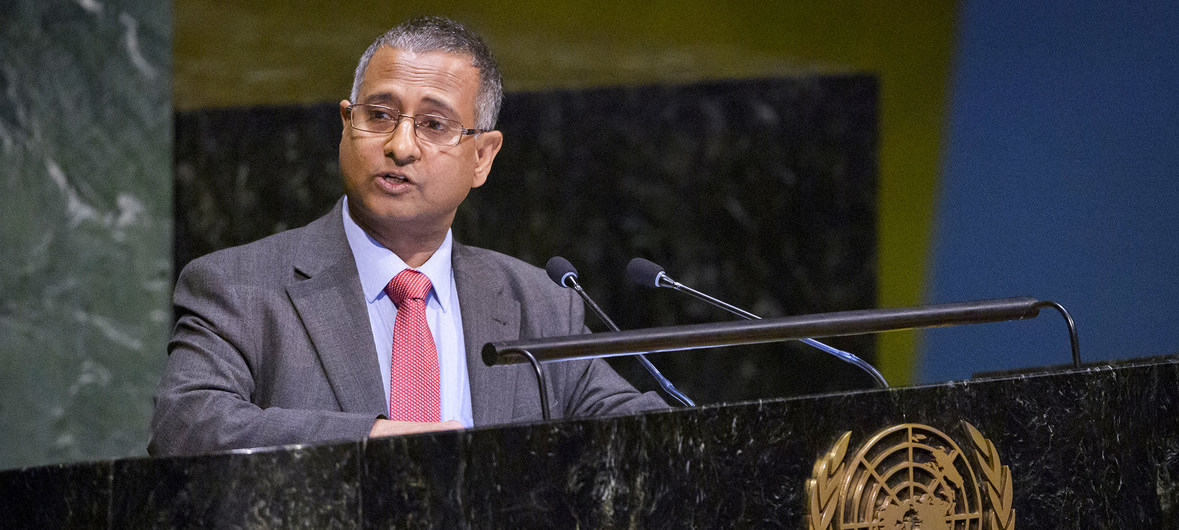ISLAMOPHOBIA AT THE UN

By: ECLJ
Photo: UN
During the last session of the Human Rights Council, the Special Rapporteur on Freedom of Religion or Belief, Mr. Shaheed, presented a report on “Combating Islamophobia”. With this report, he officially promoted the controversial notion of “Islamophobia”, and gave it an extremely broad scope.
According to him, the legal restrictions on the wearing of the Islamic veil, the urban planning rules limiting the construction of places of worship or the dissolution of radical Islamist associations throughout Europe amount to Islamophobia. He also claims that Islamophobia would be the explanation for the poor success in studies and the higher unemployment rate of Muslims in Europe.
The Special Rapporteur recommends that States adopt an “inclusive process” and a “non-legal tool” to fight against Islamophobia in their public policies. A “working definition” of Islamophobia, as a phenomenon to be fought, must fuel every policy decision. More precisely, for Ahmed Shaheed, the States must value the importance of the Muslims in the “Western civilization.” He believes that there is currently a cultural hostility to Islam in the West.
DEFAMATION OF ISLAM
Islamist lobbying has always existed at the UN and has won several ideological victories at the turn of the 20th century. In 1999, Pakistan, on behalf of the Organization of Islamic Cooperation (OIC), submitted a draft resolution against “defamation of Islam”. It was amended to condemn “defamation of religions” in general and then passed. The equivalent of a blasphemy offence was thus imposed at the international level until 2010. In 2011, a resolution of the Human Rights Council officially abandoned the concept of “defamation of religions”, in order to favor an approach in line with the major UN treaties, i.e. protecting every individual and not religious doctrines. The ECLJ contributed to this victory for the freedoms.
Ahmed Shaheed, with his 2021 report, is seeking to reverse the trend again. This is a success for the OIC. In fact, the title of the report corresponds exactly to an objective of the OIC Program of Action for 2025: “Combating Islamophobia.” Mr. Shaheed thus brought the Islamist lobby back to the forefront of the international scene (See our radio program and a press article in French only).
The ECLJ did not wait to criticize the very notion of “Islamophobia”. It is based on the false idea that any opposition to Islam would be the manifestation of a “phobia” – that is, an irrational and pathological fear – or a feeling of “hatred”. Actually, the choice not to adopt and therefore to reject Islam can be based on rational arguments and a realistic reflection on the dangers of Islam. In the same way, because of the political and totalizing dimension of this religion, a State must be able to legitimately restrict its manifestations.
LETTER TO UN
In the same way, the notion of “Christianophobia” is not the most appropriate one to denounce the persecutions against Christians. Nonetheless, at the UN, the two notions of anti-Semitism and “Islamophobia” are systematically associated with “Christianophobia”, as three “phobias” to be treated on an equal footing. Given that Ahmed Shaheed has written a report entitled “Combating Anti-Semitism” (2019) and another entitled “Combating Islamophobia” (2021), it would therefore make sense for him to also address “Combating Christianophobia.”
This reminder is not intended to promote unhealthy victimhood competition, but justice and peace between communities.
The ECLJ sent a letter to Mr. Shaheed encouraging him to write such a report and offering to provide him with the information he would need on the persecution of Christians, based on our daily work. For example, this past month we supported a Pakistani asylum seeker who converted to Christianity before the European Court of Human Rights (ECHR), with the help of our team in Pakistan (case M.A.M v. Switzerland, No. 29836/20). We also published a report and a video, after several weeks of investigation, on the persecution of ex-Muslim Christians in France. In its letter to the UN expert, the ECLJ also reminded him that the Christian religion remains the most persecuted in the world.




